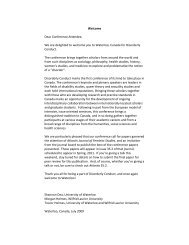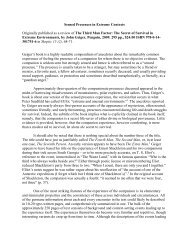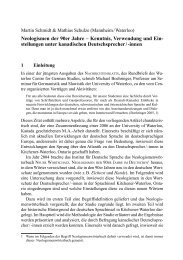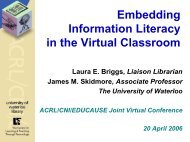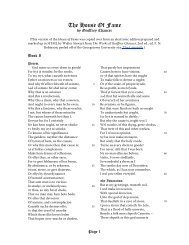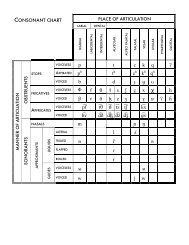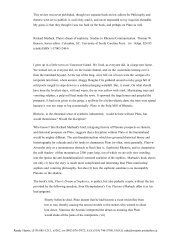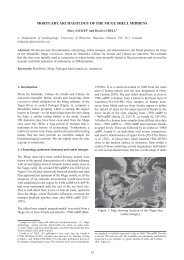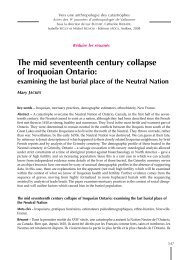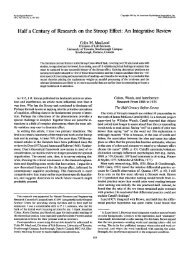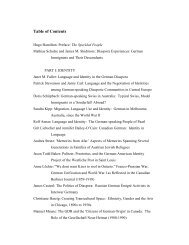Individual Differences in Learning and Memory: A Unitary ...
Individual Differences in Learning and Memory: A Unitary ...
Individual Differences in Learning and Memory: A Unitary ...
You also want an ePaper? Increase the reach of your titles
YUMPU automatically turns print PDFs into web optimized ePapers that Google loves.
Attention<br />
DIFFERENCES IN LEARNING AND MEMORY 533<br />
SOURCES OF INDIVIDUAL DIFFERENCES<br />
To beg<strong>in</strong> exam<strong>in</strong><strong>in</strong>g <strong>in</strong>dividual differences <strong>in</strong> attention, some sort of<br />
model is required. Kahneman (1973) <strong>and</strong> Norman <strong>and</strong> Bobrow (1975) have<br />
proposed rather similar systems based on the core notion of a s<strong>in</strong>gle pool<br />
of attentional resources available for the <strong>in</strong>dividual to allocate. This class<br />
of models offers some rather straightforward possibilities for an <strong>in</strong>dividual<br />
differences analysis. For example, <strong>in</strong>dividuals might differ <strong>in</strong> how effec-<br />
tive they are at mobiliz<strong>in</strong>g these resources when attention must be<br />
switched from one <strong>in</strong>put to another. Gopher <strong>and</strong> Kahneman (1971) pre-<br />
sent evidence <strong>in</strong> support of this prediction-the ability to switch attention<br />
from one ear to the other is an orderly function of the proficiency of<br />
military pilots. The same sort of pattern emerged <strong>in</strong> a later study us<strong>in</strong>g bus<br />
drivers’ safety records as the criterion variable (Kahneman, Ben-Ishai, &<br />
Lotan, 1973). Interest<strong>in</strong>gly, driv<strong>in</strong>g ability is a rather poor predictor of<br />
errors <strong>in</strong>focused attention <strong>in</strong> these same studies. Apparently, safe drivers<br />
make fewer errors when switch<strong>in</strong>g attention, but are not superior other-<br />
wise! This suggests that a study of <strong>in</strong>dividual differences <strong>in</strong> decision<br />
mak<strong>in</strong>g might have been quite reveal<strong>in</strong>g.<br />
More recently, Lansman (Note 7) has approached the exam<strong>in</strong>ation of<br />
<strong>in</strong>dividual differences <strong>in</strong> attention <strong>and</strong> memory from a different perspec-<br />
tive. Her hypothesis was that attention might play a central role <strong>in</strong> a<br />
person’s ability to ma<strong>in</strong>ta<strong>in</strong> a memory load <strong>and</strong> perform another task<br />
simultaneously, a situation we f<strong>in</strong>d ourselves <strong>in</strong> all too often. She tested<br />
this hypothesis with a secondary task methodology, us<strong>in</strong>g verbal ability as<br />
the critical <strong>in</strong>dividual differences variable. Although a subject’s digit span<br />
predicted how many items could be held <strong>in</strong> STS without attention (i.e.,<br />
while perform<strong>in</strong>g a second, attention-dem<strong>and</strong><strong>in</strong>g task), overall verbal<br />
ability was not predictive. Furthermore, verbal ability failed to predict<br />
rehearsal efficiency <strong>in</strong> STS, as measured by how much spare attentional<br />
capacity a subject had available to respond to an extraneous probe while<br />
perform<strong>in</strong>g a memory task.<br />
If one views Lansman’s tasks as more <strong>in</strong> the “focused” attention<br />
tradition, then her results can be seen as consistent with those of Kahne-<br />
man et al. (1973) <strong>and</strong> Gopher <strong>and</strong> Kahneman (1971). However, respond<strong>in</strong>g<br />
to a probe apart from the memory task does appear to be an attention-<br />
switch<strong>in</strong>g situation. Perhaps the <strong>in</strong>consistency between the two sets of<br />
studies stems from the dissimilarity of the variables chosen to def<strong>in</strong>e the<br />
<strong>in</strong>ter-subject differences. Whatever the reason, it still appears that the<br />
role attention plays <strong>in</strong> the memory system can be studied from the per-<br />
spective of <strong>in</strong>dividual differences. In fact, given the problems <strong>in</strong> theoriz-<br />
<strong>in</strong>g about attention, <strong>in</strong>dividual differences studies may provide fertile



